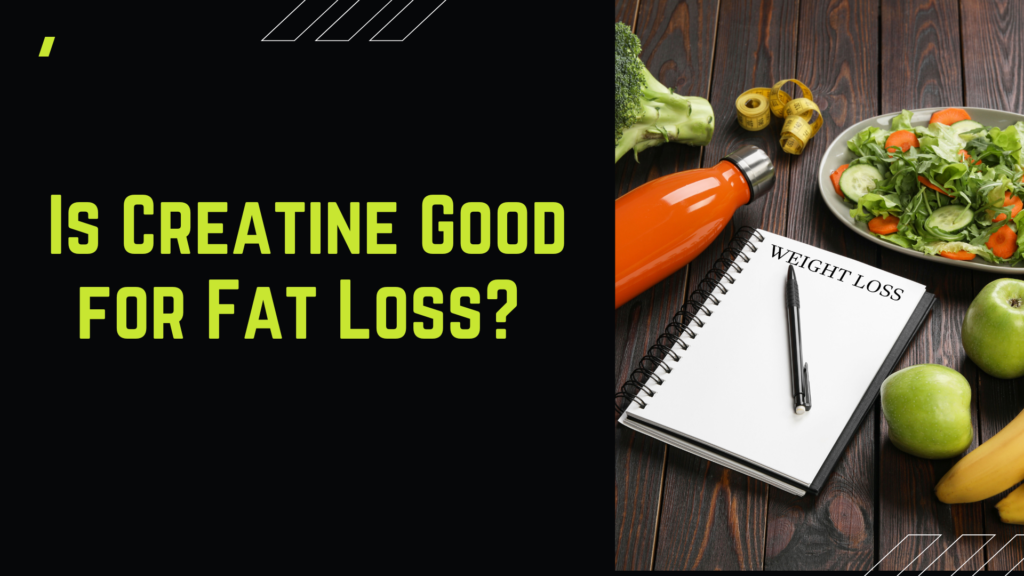Creatine’s reputation is legendary in the fitness world, often praised for its muscle-building powers. But if you’re on a mission to lose fat, can creatine help—or hurt—your goals? Today, I’ll dive deep into the science to reveal whether creatine truly plays a role in fat loss and how you can best use it to your advantage.
Understanding The Impact of Creatine on Fat Loss
The Science Behind Creatine and Fat Loss
Several studies have found that creatine indirectly aids fat loss by improving workout performance and preserving muscle during calorie cuts. Studies published in the National Library of Medicine highlighted creatine’s benefits, showing:
- 5-8% increase in strength during resistance training
- Up to 10% improvement in high-intensity exercise capacity
- Enhanced recovery between sets, promoting effective workouts
These benefits mean that with creatine, you can push harder in the gym and maintain muscle mass while dieting—two essential ingredients in effective fat loss.
How Creatine Helps Preserve Muscle in a Caloric Deficit
When you’re cutting calories, your body often turns to muscle tissue for energy, potentially leading to muscle loss. But creatine steps in here by supporting protein synthesis and reducing muscle protein breakdown. Studies show that creatine can help retain lean muscle mass during a calorie deficit, ensuring you’re burning fat, not muscle. This preservation is vital because more muscle means a higher resting metabolism, which can aid fat loss in the long run.
Water Retention: What You Should Know
One concern I often hear about is creatine and water retention. Here’s how it works: creatine pulls water into the muscle cells, not under the skin. This means any added water weight is generally focused within the muscles, giving them a fuller appearance rather than causing bloat. According to Gavin Van De Walle, MS, RD, the water retention stabilizes within two weeks as your body adjusts. Staying hydrated helps minimize any excess water retention, leaving you with defined, lean muscle.
Gender-Specific Advice on Creatine Use for Fat Loss
For Women
Women can typically avoid creatine loading, instead opting for a steady dose of 3-4 grams daily. Many find that this dosage minimizes initial water retention. Additionally, studies show that creatine intake during the luteal phase of the menstrual cycle (the second half) may enhance fat oxidation, allowing for even more fat-burning potential.
For Men
Men may benefit from a 4-5 gram daily dose, with the option to load (around 20g per day for 5-7 days) if quick results are desired. Loading fills the muscles with creatine faster, allowing for earlier performance benefits, which can support your fat-loss training.
Creatine and Fat Burners: Can You Combine Them?
Yes, you can take creatine with fat burners. In fact, combining creatine with a stimulant-based fat burner, like caffeine, can work well, as creatine aids recovery while caffeine boosts metabolism and energy.
For non-stimulant fat burners, creatine remains a great addition, helping to preserve muscle while fat burners focus on burning extra calories. If you’re on any medication or have health concerns, though, consulting a healthcare provider is a good move.
Practical Tips for Taking Creatine to Support Fat Loss
Want to get the best results with creatine? Here’s a sample daily schedule to maximize its fat loss potential:
- Morning (6:30 AM): Take 3 grams of creatine with water after waking up.
- Pre-Workout (3:00 PM): Eat a small, protein-rich snack.
- Workout (4:00 PM): Complete a high-intensity workout like HIIT or weightlifting.
- Post-Workout (5:30 PM): Add 2 grams of creatine to your post-workout protein shake.
This schedule helps creatine support muscle recovery, enhances workout performance, and, ultimately, keeps your fat-loss efforts on track!
Safety and Health Checks
Creatine is well-tolerated in healthy adults, with side effects like digestive discomfort, thirst, or mild cramping occurring only occasionally. Before starting, consider a kidney function test (GFR), especially if you have any history of kidney issues, to ensure the safe metabolism of creatine. For most people, creatine is a safe, effective supplement with few adverse effects when taken in the right doses.
To know more about the impact of creatine on kidney health, I’d recommend you to read, my article on the topic, “Is Creatine Safe for the Kidneys?“
Key Takeaways
- Effectiveness: Creatine supports fat loss by enhancing workout performance and preserving muscle during a caloric deficit.
- Water Retention: Any water retention is temporary and intramuscular, generally resolving within a couple of weeks.
- Dosage: 3-5 grams daily is typically sufficient, with the option of a loading phase for faster saturation.
- Combining with Fat Burners: Creatine pairs well with stimulants like caffeine but consult a doctor if you’re on medication.
- Safety: Well-tolerated by most, but checking kidney health before starting is a smart precaution.
FAQs About Creatine and Fat Loss
Can you lose fat on creatine?
Yes, while creatine doesn’t directly burn fat, it boosts workout performance and helps preserve muscle during a caloric deficit, indirectly supporting fat loss.
Can I take a fat burner with creatine?
Yes! Creatine works well with fat burners. Just keep an eye on your hydration, as both supplements may increase your body’s need for water.
Does creatine help lower belly fat?
Creatine doesn’t specifically target belly fat but can help you build and retain muscle, boosting your metabolism and aiding in overall fat loss.
Should I take creatine if I’m overweight?
Creatine can be beneficial regardless of weight, especially if you’re working out to lose fat. It supports better workouts and helps preserve muscle, making it an effective tool in any weight loss plan.
Conclusion: Is Creatine Good for Fat Loss?
Creatine’s role in fat loss might surprise you, but the science is clear: while it doesn’t directly burn fat, creatine can give you an edge in the gym, helping you work harder, preserve muscle, and support your fat-loss journey. As always, consult a healthcare provider if you’re considering combining creatine with other supplements. With the right approach, creatine can be a powerful ally in achieving a leaner, stronger you.

Mohammad Nazif Uddin is a Marketing and Supply Chain Management student and fitness enthusiast with over 5 years of bodybuilding experience. As the founder of Muscle Theory, he shares practical insights on fitness supplements to help others make informed choices and achieve their goals safely.

